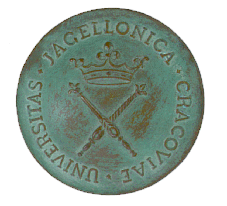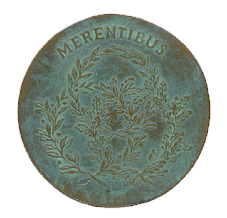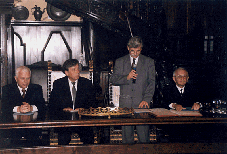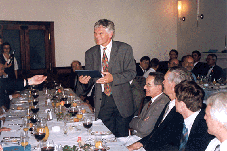THE MERENTIBUS MEDAL TO PROFESSOR
WALTER OELERT, Ph.D.

By the virtue of the decision of the University Senate,
the Merentibus Medal, the highest distinction of the
Jagiellonian University, was awarded to Professor Walter Oelert
from Germany by the University Rector Professor Franciszek Ziejka.
The ceremony was held on 25th September 1999 in Stuba Communis,
the representative Hall of Collegium Maius, which is the oldest
building of the University
In his laudatory address, Professor Lucjan Jarczyk described the
inestimable merits of Professor Walter Oelert in the development
of the exemplary and successful collaboration between physicists
from the Jagiellonian University and the Research Centre Jülich
in Germany.
He stressed that the scientific success of many physisist from
our University is due to his enormous personal engagement.
Before the Rector invited guests to toast the guest,
Professor Walter Oelert expressed his thanks by giving a short
speech in Polish and gaining the sympathy of the whole audience.

The ceremony was preceded by a Symposium on ten years of the
Jülich - Kraków Collaboration on the accelerator COSY,
which took place in the Michal Bobrzyñski Conference Hall
in Collegium Maius.
The meeting was opened by the talks of Professor Walter Oelert
and Professor Lucjan Jarczyk, who presented some of the highlights
of the 20 years of the Jülich - Kraków collaboration
in the field of a nuclear physics, and 10 years of common research
at the high precision particle accelerator COSY.
These presentations were followed by contributions from Professors
K. Kilian, S. Krewald, A. Szczurek, H. Ströher and A. Magiera
on present and future physics at COSY.

Thanks to Professor Walter Oelert, we have managed to create
up-to-date equipped laboratories in the Institute of Physics
at our University.
These eliver high quality particle detectors to many experiments
carried out at the European research centers.
Many physicists from our University have opportunities to perform
experiments at the modern physics facilities of the Research
Centre Jülich, and these have resulted in numerous doctoral
and habilitation dissertations.
The effects of the continuing collaboration can be counted
through the impressive number of a common physics works published
in the most prestigious journals.
The series of conferences, initiated in 1991 by Professor
Walter Oelert and Professor Lucjan Jarczyk and organised in
Kraków, is well recognised in the international community.
The next conference in this series will take place this year and,
for the first time, will unite medium and high energy particle
physicists.

Being a great personality, Professor Walter Oelert managed to
create in our group a real family and creative atmosphere,
which results in a perfect performance of many experiments and
in the formation of friendly relationships between German and
Polish physicists.
As stressed in the diploma, read in Latin by
Professor Karol Musiol, Dean of the Mathematics and Physics Faculty,
Professor Walter Oelert is distinguished for his many outstanding
contributions in physics.
These include the successful development of the experimental
programme of meson production at the accelerator COSY and the
splendid achievement of synthesising atoms of antihydrogen,
the very first antimatter atoms created consciously by man in
the laboratory.
Such antimatter has often been produced in laboratories over
the last 40 years.
However it was only in 1995 that, under the leadership of
Professor Walter Oelert, the international group of physicists
in the CERN laboratory managed to show that they had obtained
experimentally eleven atoms of antihydrogen.
The investigations are being continued and, in the next few years,
the colour of light emitted by hydrogen and antihydrogen
will be compared with fantastic accuracy.
If a difference were observed then this would change the basis
of contemporary physics.
Pawel Moskal, Ph.D.
Nuclear Physics Department, JU